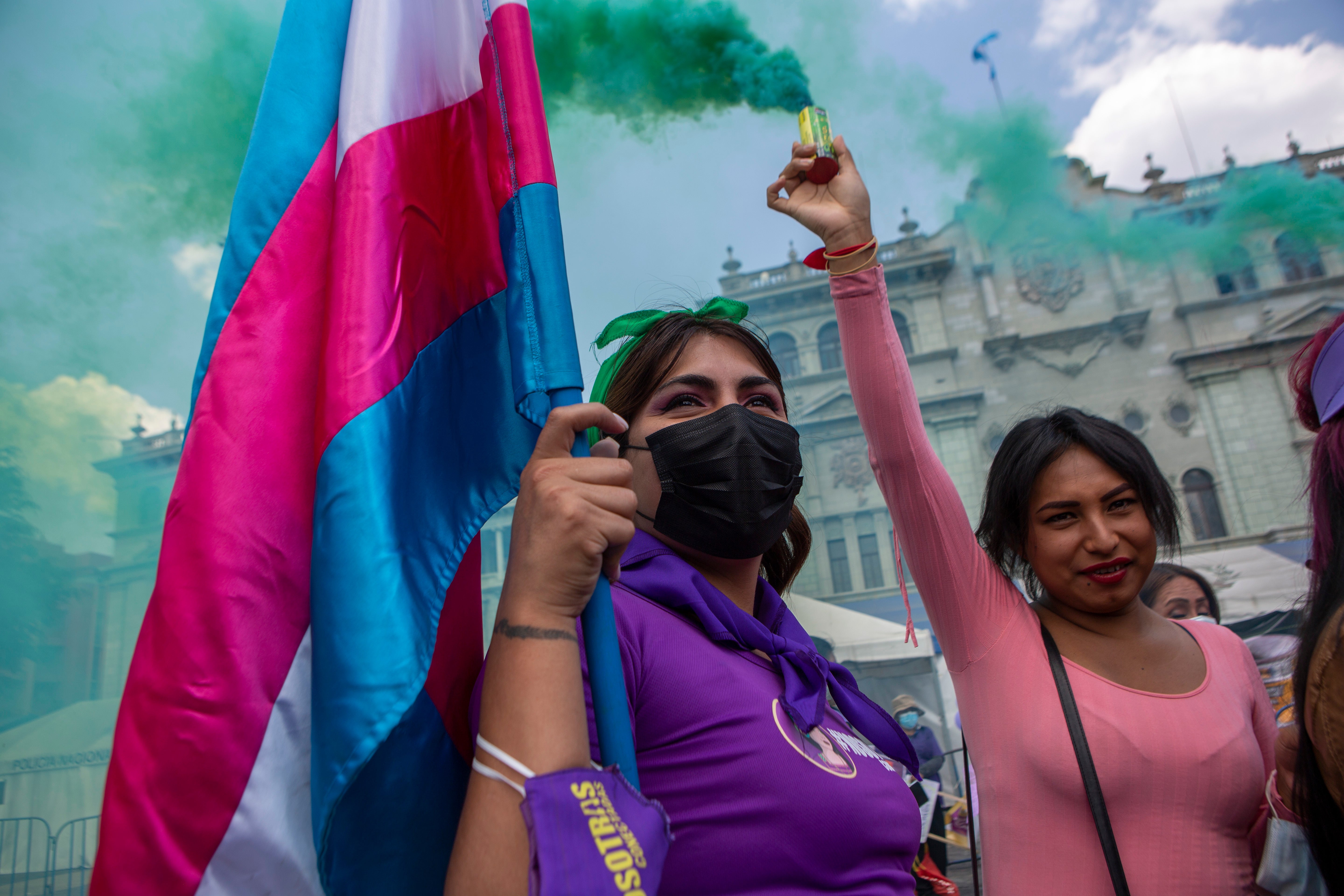Guatemala’s move to triple jail sentences for abortions and ban same-sex marriage constitutes ‘vile attack’
Bill fosters ‘miseducation, stigma, intolerance and homophobia, fuelling the persecution of LGBT+ and non-binary people,’ says campaigner

Guatemala’s decision to triple jail sentences for abortions and issue an explicit ban on same-sex marriage are “hate-fuelled policies” that constitute a “vile attack” on the most vulnerable people in the country, campaigners have said.
New legislation means women in the Central American country can now face sentences of up to 10 years in prison for terminating a pregnancy, whereas the previous maximum sentence was three years.
Measures in the bill, which passed by a landslide last Tuesday – International Women’s Day – also block schools from teaching about sexual diversity, barring material that could “deviate [a child’s] identity according to their birth gender”.
However, in an unexpected move, the country’s president, Alejandro Giammattei, announced he had asked Congress to revoke the legislation, saying that he would otherwise veto the controversial bill.
In a speech on Thursday, the president argued that the legislation infringed the country’s own constitution as well as being at loggerheads with two international conventions that the country is signed up to. This was after Congress had announced that Wednesday 9 March would be “Life and Family Day”.
Paula Avila-Guillen, executive director of the Women’s Equality Centre, said the legislation was a “vile attack on the country’s most vulnerable, and perhaps the worst of a series of assaults against women, girls, and LGBT+ people in the region”.
“The anti-rights groups are entrenching their hate-fuelled policies in the few countries where they still maintain strongholds, in a futile attempt to resist the unstoppable wave toward the recognition of human rights that is taking over Latin America,” the campaigner told The Independent.
Ms Avila-Guillen argued that lawmakers had profoundly “miscalculated” the “unifying” force the move has aroused in human rights activists.
Guatemala has chosen to criminalise those making the best decision for themselves and their families, while also risking imprisoning vulnerable women and girls who have experienced sexual violence or suffered pregnancy loss
“Since the passing of this law, in only 48 hours we have already seen massive global outrage, and legal challenges to the law have already been announced,” she continued.
“In a country with heartbreaking rates of child sexual abuse and child pregnancy, eliminating comprehensive sex education and access to life-saving health services will have catastrophic consequences in the lives of girls and women impacted by sexual violence.
“And let’s be clear, this type of measure doesn’t only attack the individuals it singles out and targets, it is a threat against the cornerstones of democracy, which guarantee equality to all before the law.”
Human rights organisations have argued that more women will be forced to resort to dangerous, clandestine abortions if the measures are rolled out – with maternal deaths subsequently rising.
Eugenia Lopez Uribe, the International Planned Parenthood Federation’s regional director for Americas and the Caribbean, told The Independent: “It is disturbing that on International Women’s Day 2022, the Guatemalan Congress passed a law that completely violates the human, sexual and reproductive rights of women, girls and marginalised people.
“While countries across Latin America were celebrating the lives and rights of women, Guatemala has chosen to criminalise those making the best decision for themselves and their families, while also risking imprisoning vulnerable women and girls who have experienced sexual violence or suffered pregnancy loss.”
Ms Lopez Uribe argued that, by curtailing the access to “safe and post-abortion care”, the legislation would “undoubtedly lead to an increase in unsafe abortions and a decrease in prenatal care, resulting in lifelong disabilities for some women and a rise in maternal deaths”.
Meanwhile, blocking same-sex marriage and teaching retrograde views about sexuality would lead to the government fostering “miseducation, stigma, intolerance and homophobia and fuelling the persecution of LGBT+ and non-binary people”, she said.
The campaigner added: “The International Planned Parenthood Federation strongly condemns the passing of this archaic law and demands that the Guatemalan government fulfils international human rights agreements.”
Current laws mean abortion is only allowed if a woman’s life is at serious risk, with the procedure needing to be advocated by a doctor. However, a pregnancy termination would need to be signed off by three gynaecologists under the new legislation.
Dee Redwine, Latin America regional director for the Planned Parenthood Federation of America, said: “It is a cynical attempt by the Guatemalan government to distract from its failure to attend to the real problems faced by Guatemalan women and girls every day: persistent violence, a failed justice system, poor healthcare, restricted rights, and deep inequities.’’
Colombia became the latest country in Latin America to decriminalise abortion last month, in a move campaigners hailed as a “historic victory” for millions of women who have long faced fiercely restrictive abortion policies.
Argentina became the first major Latin American country to legalise abortion at the end of December 2020, while Mexico’s Supreme Court ruled in September last year that criminal penalties for having a pregnancy terminated were unconstitutional.
Join our commenting forum
Join thought-provoking conversations, follow other Independent readers and see their replies
Comments

Bookmark popover
Removed from bookmarks